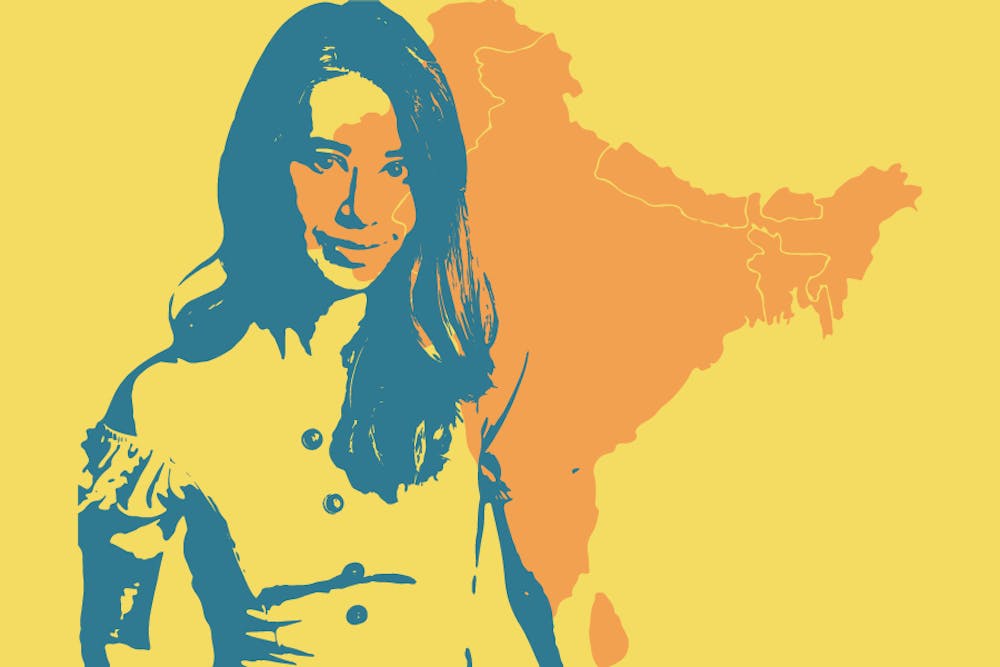Definition Please, directed by and starring Sujata Day, begins with a flashback of a young Monica Chowdry correctly spelling out "opsimath," earning herself the title of the 2005 Scribbs National Spelling Bee champion. What she seems to be doing is spelling out success—the audience is set up to believe that this is a story about a precocious child going on to do great things.
However, when the film fast forwards to the present day, all expectations are shattered: Monica’s still living in her childhood home in Greensburg, and splits her time between tutoring kids in the neighborhood—relying on her credibility as an ex–spelling bee champ—and taking care of her ill mother. She receives a job offer at a clinical research lab in Cleveland, but for the most part, she appears to drift through life with little purpose. Within the first ten minutes of the film, Day makes one thing clear: this is not your average, stereotypical portrayal of South Asians.
In introducing a South Asian character who isn’t embellished with fancy accolades, Day addresses a common insecurity: the fear of failing to achieve conventional forms of success among Asian Americans, propagated by the model minority myth. Day articulates this sense of lost potential in a scene where the mother of one of Monica’s tutees labels her as a failure for not capitalizing on her childhood success.
The rest of the film sees Monica grapple with not just her ambitions, but her strained relationship with her estranged brother, Sonny. He comes back home, to her utter displeasure, to attend their father’s memorial and it is revealed that their seemingly petty fights are rooted in something deeper—Sonny struggles with bipolar disorder but doesn’t want to admit it. This alienated Monica, who presumably bore witness to his violent tendencies but couldn't convince him to get help. This brings attention to the stigmatization of mental health in the Asian American community, which has too often caused people to retreat, rather than treat. In an interview with The Hindu Daily, Day recalled “When we reached 9th or 10th grade, one of our [Indian–American] friends ran away from home."
Day tackles the theme of mental health with refreshing nuance, offering her interpretations on how and why mental health issues remain unaddressed and feelings get bottled up in South Asian households. It is only through honest conversations that the family is able to heal from their trauma and admit their mistakes. In many ways, the film is a love letter to familial love.
Perhaps the most striking part about this indie dramedy is that it explores the experiences of a first–generation Indian American without making questions about her identity central to the plot. In fact, both Monica, affectionately nicknamed Boony, and Sonny are incredibly at ease with their heritage and intercultural identities. Desi culture is woven into the fabric of the movie, like when the siblings share a can of Thums Up, a popular Indian soft drink, or play a game of carrom. The intersection of Western and South Asian culture is also reflected in Day’s directorial choices: she fuses features of Western indie films and Bollywood classics. Keep an eye out for the comedic slo–mo scenes, where the camera subverts the male gaze by shamelessly scrutinizing an attractive male passerby, backed with a soundtrack reminiscent of Bollywood films.
Inspired by Issa Rae’s The Misadventures of Awkward Black Girl, in which she co–stars as CeCe, Day creates a narrative that undermines the monolithic perception of the South Asian diaspora. Definition Please stands out in its ability to normalize flaws and invite universally relatable conversations about family dynamics and conflicts (as well as gifted child burnout). Above all, its female lead subverts damaging South Asian stereotypes by rejecting characters whose only interesting quality is being Asian, whose love life revolves around an arranged marriage, and whose main purpose is to add dimension to the white protagonist.
Granted, South Asian representation in films is far from perfect; in the 2020–2021 season, the South Asian share of the screen on streaming platforms was a meager 1.5 percent. On the bright side, alongside Sujata Day and Anna Khaja, the talents of actresses of South Asian heritage are slowly being acknowledged in the film industry. Maitreyi Ramakrishnan plays the short–tempered yet endlessly charismatic Devi Vishwakumar in Never Have I Ever, a coming–of–age dramedy co–created by Mindy Kaling and Lang Fisher. Simone Ashley, who plays modern–day mean girl Olivia in Sex Education, is set to co–lead the second season of Bridgerton.
With Asian reality shows like Single’s Inferno continuing to aestheticize pale skin, casting actresses of Tamil Indian heritage confronts and upends the colorist beauty ideals within Asian culture. This increasing, albeit gradual, recognition of South Asian women is also reflected in the growth of communities like BrownGirlGang, which was founded in 2017 by Sanjana Nagesh to uplift South Asian women and empower brown girls who rarely see themselves reflected in the media.
Progress isn’t just measured by the number of South Asian characters in a film—it’s measured by the diversity of narratives and stories told. By letting her own experiences growing up in an Indian American community in the predominantly white city of Greensburg guide her creation of a fictional South Asian American family, Day crafts a film that is powerful in its authentic specificity. Definition Please unapologetically challenges the expectations of an audience used to stereotypical portrayals of the South Asian diaspora, and that’s what makes it feel alive.

